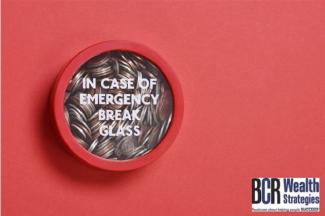
The Real Value of Your Emergency Fund
These times – the 2020 COVID 19 pandemic – highlight the value of a personal emergency fund more than ever.
When you have your regular paycheck rolling in, with no disruption in sight, you may not value your stashed cash for emergencies in the same way you do today.
Right now, you may be wondering, why didn’t I stash more?
During all the changes and distractions in your life today, keeping track of your spending and what is coming due for the next several months is essential to your short term and long-term financial health. It’s important to not just get by each day but to get by in a way that has the least negative impact on achieving your lifetime goals.
I’m suggesting you first take a very short-term look at your finances since the medical and financial worlds are changing rapidly.
Here are some suggestions for the short term:
- Evaluate your income for the next 2 months. This includes earned income, passive income, retirement income and any other income you normally use to pay your living expenses.
- Make a list of all the expected expenses for the next 2 months, for example, rent, utilities, food, etc.
- Compare the timing of the income with the timing of the expenses.
Is there enough income to cover the expected expenses?
If not, then ask these questions to increase your income or decrease your expenses:
- First look to reduce any non-essential expenses. Is there anything I can cut out?
- If I don’t pay an expense during this month, will it cost me more in the long run? For example, not paying your credit card in full cost you more in the long run.
- Is there any way I can get more income? Look for the ways people are earning money in the economy today and see if you can fill those jobs.
- As a last resort, evaluate your emergency fund and see how little you can prudently withdraw during the next 2 months to leave enough for the uncertainty of the future.
It’s a better decision to reduce spending than to withdraw from your emergency funds during this initial 2-month time period.
If you do have enough income to cover the next 2 months of expenses, next consider if the financial disruption lasts another 2 months, what will I wish I had done today to prepare for a longer time period.
If you need help evaluating your situation to ensure you are making good decisions, please reach out to a trusted friend or advisor as a sounding board.
Taking these steps earlier rather than later will empower you to see your situation more clearly and take action that will stabilize your position.
The current medical and financial situation will not last forever. Make sure that your actions don’t impact your financial goals forever.
-Sandra Cleveland-

